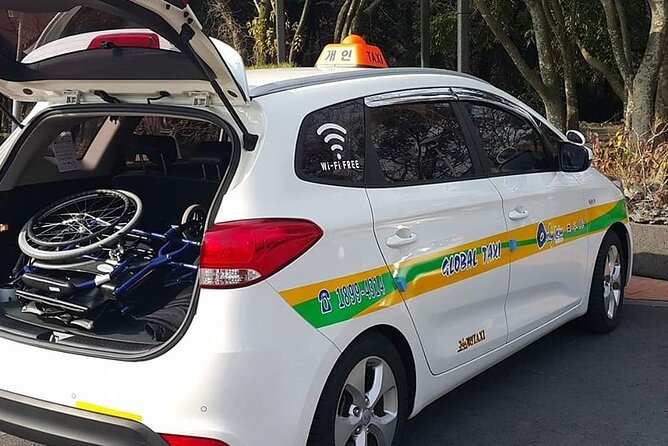In kids cooking classes, young chefs not only get to unleash their creativity but also learn essential culinary skills in a dynamic and enjoyable setting. As they chop, mix, and bake their way through a variety of dishes, children are introduced to the world of flavors and techniques in an engaging manner.
These classes not only focus on cooking but also emphasize the importance of nutrition and safety in the kitchen. Stay tuned to uncover how kids’ culinary adventures can spark a lifelong love for food and cooking, shaping their palates and skills along the way.
Key Points
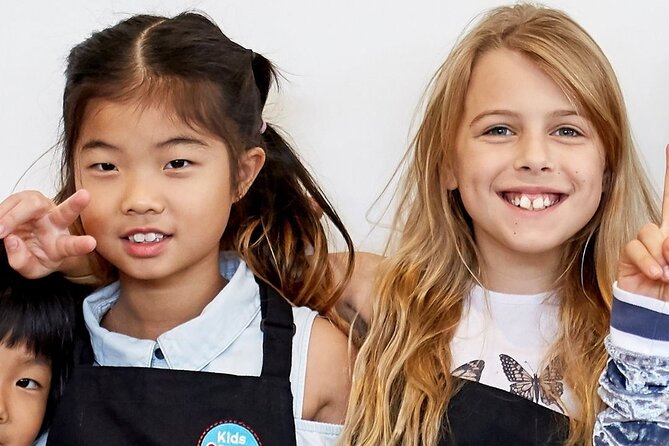
- Interactive and educational experiences develop culinary skills.
- Emphasize kitchen safety and health benefits of fresh ingredients.
- Classes cater to ages 8-16 and include diverse cuisines.
- Fun activities like Recipe Relay enhance learning and engagement.
It's also worth checking out some other tours and experiences nearby.
Benefits of Kids Cooking Classes
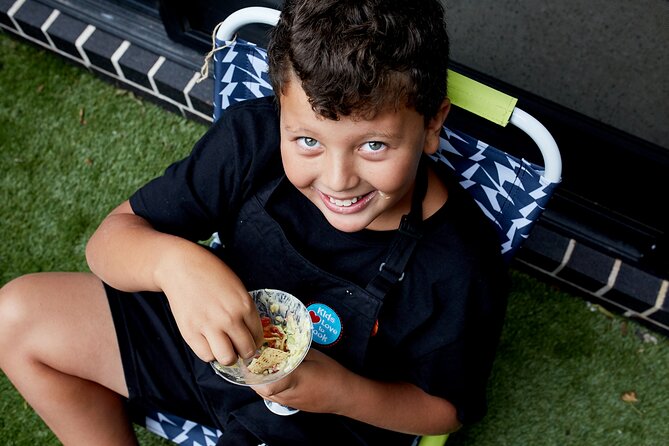
Kids cooking classes offer an interactive and educational experience, allowing children to develop important culinary skills in a fun and engaging environment. In these classes, kids not only learn about cooking techniques but also benefit from the health advantages of preparing their meals with fresh ingredients.
By engaging in hands-on cooking activities, children enhance their culinary skills while also gaining knowledge about nutrition and healthy eating habits. On top of that, these classes provide an excellent opportunity for social interaction, where kids can work together, share ideas, and build teamwork skills.
The educational aspect of kids cooking classes goes beyond the kitchen, instilling valuable life skills and fostering a love for cooking that can last a lifetime.
Age Range and Requirements
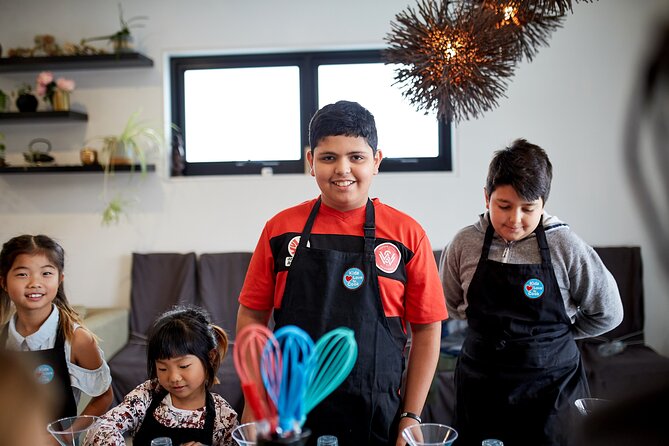
Exploring the age range and specific requirements for participation in these cooking classes offers valuable insights for parents seeking to enroll their children in this enriching culinary experience.
The age range for kids cooking classes typically varies, but most programs cater to children between the ages of 8 to 16 years old. Some classes may have specific age groups to ensure that the content is suitable and engaging for the participants.
In terms of skill level, most classes are designed to accommodate beginners with little to no cooking experience. Basic knife skills and kitchen safety are usually taught at the start of the program to ensure that all participants can actively participate and learn in a safe environment.
Types of Dishes Taught
In these engaging cooking classes for children, a variety of dishes ranging from simple snacks to more complex meals are taught to enhance their culinary skills and creativity. Kids get to explore different recipe varieties and cooking techniques while delving into various cultural cuisines and learning to accommodate dietary restrictions.
Here are some examples of the types of dishes commonly taught in these classes:
- Homemade Pizza: Children learn to make their pizza dough from scratch and top it with their favorite ingredients.
- Sushi Rolls: They discover the art of sushi-making, using fresh ingredients and mastering the art of rolling.
- Taco Tuesday Delight: Kids enjoy creating flavorful tacos with various fillings and toppings.
- Decadent Cupcakes: Learning the basics of baking, kids get to decorate and personalize their sweet treats.
Importance of Kitchen Safety
Understanding the importance of kitchen safety is paramount in fostering a secure environment for culinary exploration and learning. In kids cooking classes, it’s crucial to be aware of potential kitchen hazards and to take appropriate safety precautions.
Sharp knives, hot stoves, and electrical appliances are common dangers that children need to be educated about. Safety measures such as using oven mitts, handling knives carefully, and turning pot handles away from the stove can prevent accidents. Instructors should emphasize the importance of proper handwashing to prevent foodborne illnesses.
Teaching kids to clean up spills promptly to prevent slips and falls is also essential. By instilling good kitchen safety habits early on, children can enjoy cooking in a safe and controlled environment.
Fun Activities and Games Included
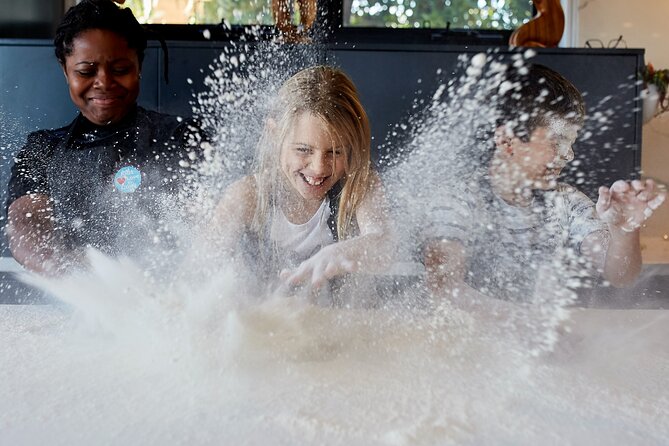
With kitchen safety as a foundational principle, kids cooking classes also incorporate a variety of fun activities and games to enhance the learning experience and keep young chefs engaged and excited.
- Recipe Relay: Children work in teams to follow a recipe, with each team member completing a step before passing it on to the next.
- Ingredient Scavenger Hunt: Kids search for specific ingredients in the kitchen, teaching them about different foods and where to find them.
- Technique Tic-Tac-Toe: A fun twist on the classic game where participants answer cooking technique questions to place their X or O.
- Decorating Delights: Children get creative decorating cupcakes or cookies, learning about presentation and design in cooking.
These activities make learning fun and interactive, helping kids develop a love for cooking through hands-on experiences with fun recipes and cooking techniques.
How to Enroll Your Child
To enroll your child in the exciting and educational kids cooking classes, parents can easily secure a spot by following a few simple steps on the booking platform.
The enrollment process is straightforward and designed to ensure a smooth registration experience for parents. Parents are encouraged to visit the class’s webpage on the booking platform, where they can find all the necessary information about the class schedule, age requirements, and pricing.
Common questions
Customers often inquire about the details of the kids cooking classes program before enrolling their children. To address some of the common misconceptions and provide clarity, here are some frequently asked questions:
-
Is prior cooking experience required for children to join the classes?
- No, the classes are designed for all skill levels, including beginners.
-
How much parent involvement is expected during the classes?
- While parental supervision is encouraged, our instructors lead the sessions, allowing parents to observe from designated areas.
-
Are ingredients and utensils provided, or should children bring their own?
- All necessary ingredients and cooking tools are supplied by the cooking school.
-
Do the classes cater to specific dietary restrictions or allergies?
- Our classes can accommodate certain dietary needs; please inform us in advance to make necessary arrangements.
Here's a few more nearby tours and experiences we think you'll like.
- Blue Mountains Hiking Glow Worms Cave Wildlife Spotlighting Night Adventure
- Taste of Sydney – Barangaroo and the Rocks
- Opera Performance at the Sydney Opera House
- Private 1 Day Full Blue Mountains Tour Koalas Cruise Return
- Private Luxury Sydney Harbour Cruise
- Private Tour: Sydney City Highlights & Hidden Gems
Common questions
What Is the Instructor to Child Ratio in the Kids Cooking Classes?
In group dynamics, the balance between individual attention and overall engagement is crucial for effective learning. Providing adequate support enhances the learning experience for all participants. It’s a delicate interplay that skilled instructors navigate with finesse.
Are Parents Allowed to Stay and Observe During the Classes?
Instructors encourage parent involvement in most activities to enhance learning and bond with children. However, privacy concerns and fostering child independence warrant limited observation. Balancing these aspects fosters a supportive environment while allowing children autonomy.
Is There a Minimum Number of Sessions Required to Enroll in the Kids Cooking Classes?
The class duration varies based on the program selected. Age restrictions may apply, but skill level is typically beginner-friendly. The enrollment process usually requires signing up for a minimum number of sessions to ensure continuity and progress.
Are There Any Dietary Restrictions or Allergies Taken Into Consideration When Planning the Dishes Taught?
When planning the dishes taught, consideration is given to food allergies and dietary preferences. The instructors ensure that the recipes can accommodate various restrictions, creating an inclusive and safe environment for all participants.
Are There Any Take-Home Materials or Recipes Provided for the Children to Continue Practicing at Home?
When participants attend an activity, they often wonder if they’ll receive materials to continue practicing at home. Typically, such activities provide recipe cards for guidance and sometimes even take-home ingredients to facilitate further learning.
Not for you? Here's more of our most recent tour reviews happening neaby
- 7-day Iconic Best of Sydney Escorted Tour
- Private Sydney Photography Tour With Professional Photographer
- Sydney Private Half-Day Cycling Exploration
- Wollongong Scavenger Hunt: Wollongong’s Storied History
- Blue Mountains Tour – Highlights
- Private NSW South Coast Day Trip From Sydney
- Private Coogee to Bondi Walk From Your City Hotel
- Blue Mountains Day, Sunset Tour & Glow Worms Night Adventure
- Half-Day Private Guided Tour of Sydney
- Mothers Day Lunch Cruise
- Private Luxury Hunter Valley Tour – up to 7 Guests
- Bachata Classes in Annandale
- Airport Transfer: Sydney Airport SYD to Sydney by Business Car
- Hunter Valley Private Tour the Ultimate Food & Wine Trail Depart From Sydney
- Private Day Trip to Royal National Park – up to 7 Guests
Sum Up
To sum it up, kids cooking classes offer a dynamic and educational experience for young chefs to explore their culinary talents. From learning essential cooking techniques to creating delicious and nutritious dishes, these classes provide a fun and interactive way for children to develop a love for food and cooking.
By enrolling your child in a kids cooking class, you aren’t only fostering their creativity but also teaching them valuable life skills that they can carry with them into adulthood. Join the culinary journey today!




